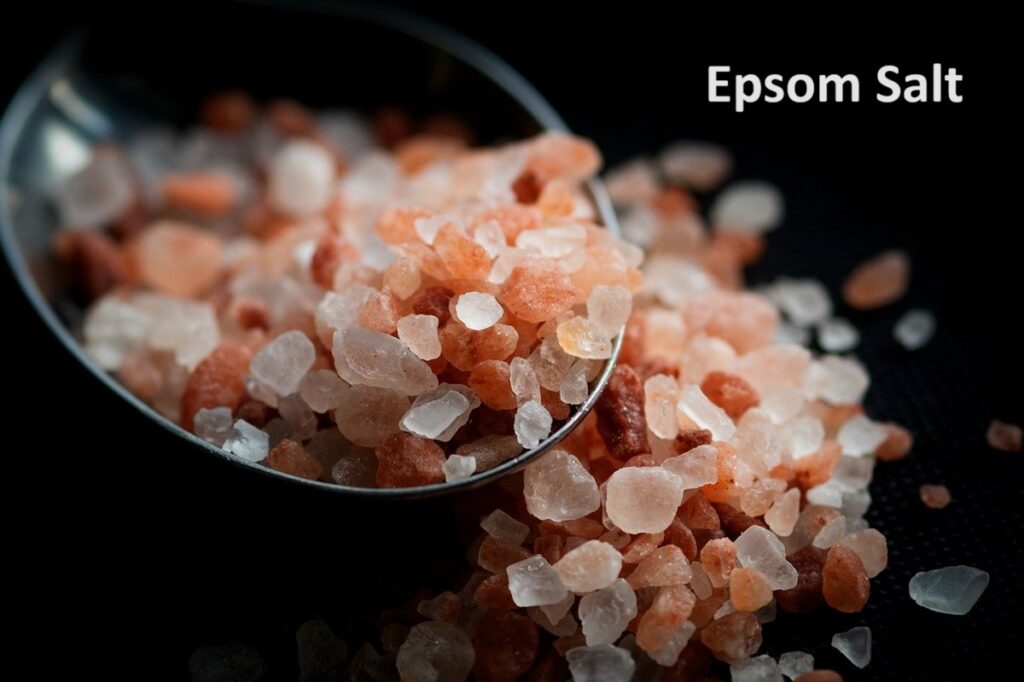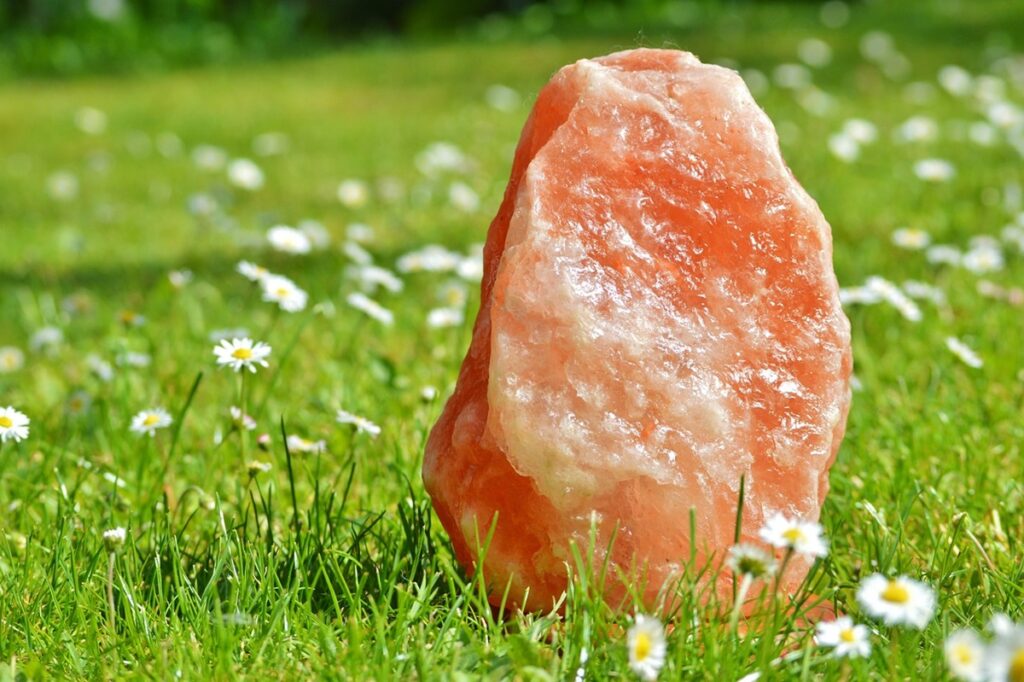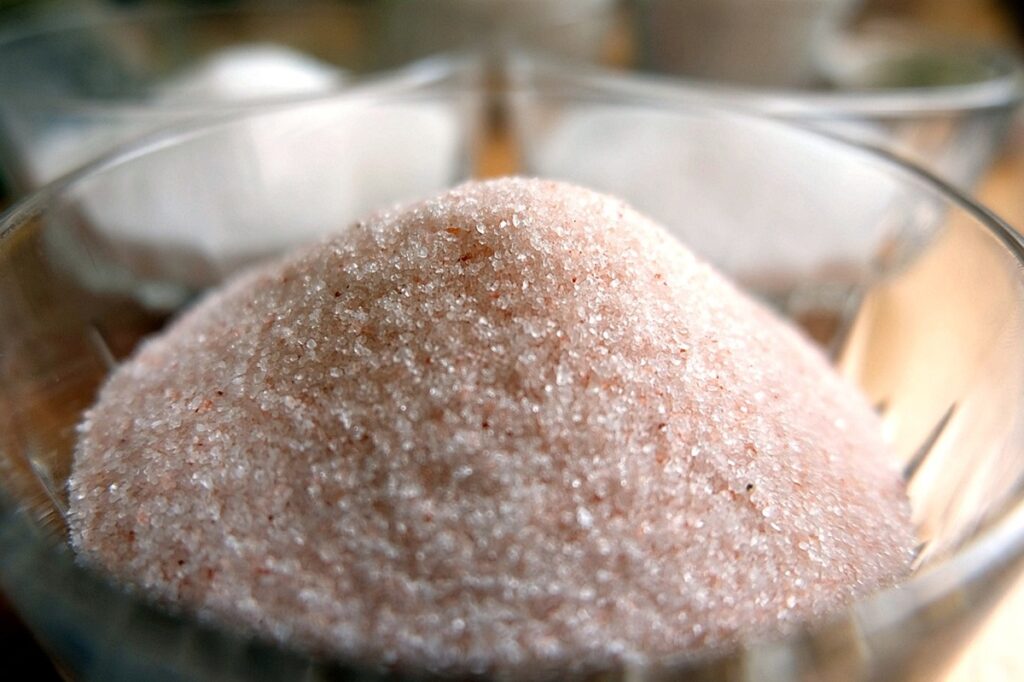
Epsom salt is not a type of salt in the traditional sense, it is a mineral compound. This salt is, in fact, a naturally occurring pure mineral compound of magnesium and sulfate. Which contains magnesium, sulfur, and oxygen.
Table of Contents
What is Epsom Salt?
It is named after the town of Epsom, Surrey, England, where it was discovered in the mineral springs first. Known as a natural cure for most diseases, It boasts many health benefits and beauty, for household, and garden uses.
It is documented that both magnesium and sulfate are easily absorbed through the skin, so a bath with this salt is one of the perfect ways to attain health benefits.
Magnesium has many missions in the body: the activity of enzymes, reducing inflammation, helping muscle and nerve function, and assisting in preventing hardening of the arteries. Sulfates also help in improving the absorption of nutrients, removing toxins, and reducing migraine headaches.
Various Uses of Epsom Salt
1-Epsom Salt Bath
The benefits of this salt baths have been used for years. Epsom salt bath is beneficial for pain, and skin diseases and also helps in detoxifying the body.
Relaxes muscles
This salt baths relax muscles and relieve tension within the muscle. Magnesium of this salt is believed to be easily absorbed via the skin, relaxing the muscles and reducing inflammation. With these soothing traits, It relieves pain and is a good choice for people who have experienced muscle pain, joint pain, or inflammatory conditions.
Epsom Salt Baths for Colds and Flu
Try these salt baths when you have a cold or flu. It treats blocked noses and headaches caused by colds and flu. Even doctors recommend patients take thi salt baths for colds and flu as it helps them recover faster.

But as soon as cold and flu symptoms start appearing, take this salt bath immediately to see good results. Bath with this salt also helps in getting a good night’s sleep. If you don’t want to take a full body bath, you can also do a foot bath.
Epsom Salt for Eczema
Eczema can affect anyone. In case of eczema, first of all, try to avoid all those creams, etc. which have strong fragrances. To prevent dry skin, keep it hydrated throughout the day, and stop using harsh soaps.
Do not take a bath with very hot water, it dries the skin. The best thing for eczema is an Epsom salt bath, take this bath as often as possible. After bathing, do not rub the skin hard, just pat it dry.
Epsom salt baths for detox
Such salt baths are great for detox. Epsom salt bath detoxifies our body very well apart from giving smooth, soft skin. Both the magnesium and sulfate present in this salt are great at flushing out toxins from the body.
Taking these salt baths twice weekly keeps the skin young and supple. Be sure to hydrate the skin before and after bathing.
Epsom Salt for Yeast Infection

It is best to take such a salt bath to get rid of yeast infection. Try taking these salt baths consistently every day until the condition improves and then continue once a week until you get complete relief.
Apart from this, wear cotton clothes and avoid harsh chemicals coming in contact with the skin, try to use homemade products as much as possible. Try organic coconut oil or homemade aloe vera oil to moisturize skin.
Reduces stress
Taking a warm bath in general is relaxing and adding this salt to the water can enhance the stress-relieving benefits. Magnesium is known to play a role in reducing stress and promoting a sense of calm.
How to Take an Epsom Salt Bath
Dissolve salt in warm water: Add this salt to warm bath water. Add generally 1 to 2 cups of this salt in the standard-size bathtub. You can increase that amount, based on personal preference.
Soak in the bath for about 15–20 minutes. Let the skin take in the magnesium.
Hydrate – It’s important to stay hydrated, so drink plenty of water before and after bathing.
Temperature – Make sure the water is at a comfortable temperature, avoid extremely hot baths.
If you have any health issues, it is advisable to consult a physician before incorporating this salt baths into your daily routine. While generally considered safe for most individuals, reactions may vary.
2-Uses of Epsom Salt for Beauty
Exfoliate dead skin
Mix a handful of this salt with a teaspoon of olive oil in the shower or bath. Massage into wet skin and then rinse off with plain water to exfoliate and soften the skin.
Exfoliating Face Cleanser
To cleanse your face as well as exfoliate your skin, mix half a teaspoon of this salt with your regular cleansing cream. Massage gently on the skin and wash with cold water.
To remove foot odor
To remove foot odor, cure foot pain, and soften rough skin, mix half a cup of tjhis salt in warm water and soak your feet in it for 10 minutes.
Hair Volumizer
Mix equal parts of deep conditioner and Epsom salt and heat in a pan. Apply this mixture to your hair and leave it for 20 minutes, then wash it with clean water.
To remove hairspray
Mix 1 cup lemon juice and 1 cup this salt in 4 liters of water. Leave the mixture closed for 24 hours. The next day, take the mixture and apply it to your dry hair. Leave it for 20 minutes then rinse your hair with shampoo.
3-Using Epsom Salt for Home Cleaning
For cleaning bathroom tiles
Mix this salt and liquid dish detergent in equal quantities and use it as a scrub on the bathroom tile.
To clean detergent build-up in a washing machine
Fill the warm water in the machine tub, add this salt, and run on empty for the removal of detergent build-up.
Effective Hand Wash
Mix this salt with baby oil to wash hands, it can be used as a hand wash.
4-Uses of Epsom Salt for Gardens
Pesticide Spray
Use these salts in your lawn and garden to protect plants from pests and get rid of them naturally.
To keep lawns green
Magnesium sulfate crystals, when added to the soil, provide vital nutrients that help prevent yellowing of plant leaves. To keep the grass healthy and green, mix 2 tablespoons of this salt in four liters of water and sprinkle it on the lawn.
For Plant Fertilizer
Most plants need nutrients like magnesium and sulfur to stay healthy, Epsom salt makes the nutrients in most plant foods (nitrogen, phosphorus, potassium) more effective. Sprinkle Epsom salt once a week to nourish your plants, flowers, and vegetables.

Side Effects of Epsom Salt Baths
It rarely has any side effects but it can be dehydrating, so hydrate yourself before and after bathing, and people who are allergic to sulfates should use caution when taking an Epsom salt bath.
Disclaimer
In this article, information related to a particular topic has been collected from various sources, the purpose of which is only to increase the knowledge of the readers and it does not confirm the existence of any disease and its treatment. Health Alpha does not take any responsibility for any such information.
Views: 0













